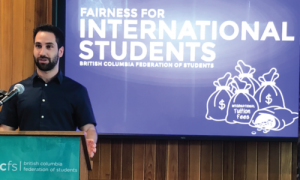
Filling funding gaps with unregulated tuition
By Katie Czenczek, News Editor
It should be no surprise that international students pay an exorbitant amount of money to receive education at BC post-secondary institutions.
On August 15, the British Columbia Federation of Students (BCFS) launched the “Fairness for International Students” campaign in hopes of convincing the provincial government to put a cap on international student tuition fees and improve services available to international students.
According to research conducted by the BCFS, international student tuition costs have risen 64 percent since 2006. This is due to international tuition being unregulated in BC. International students make up 20 percent of the student population yet produce half of tuition fee revenue in BC.
Aran Armutlu, chairperson at the BCFS, said in an interview with the Other Press that it is no coincidence that international student tuition fees have skyrocketed around the same time that government funding has dwindled for universities.
“There’s been chronic underfunding issues at our universities for about a decade. What happens then is that our institutions have their costs increasing, and they’re trying to find ways to fill those gaps in their budgets. They can’t look to domestic students because there’s that two percent cap on domestic tuition fees,” he said. “It’s clear that [universities] are relying on international students to fill the gaps for funding.”
Not only are universities making up lost revenue from international students, but international education is also listed as an industry on BC exports website—right behind Forestry, Mining, Natural Gas, and Technology—contributing $1.77 billion to the provincial GDP in 2015.
Just this year, Douglas College’s international student tuition increased by nine percent, said Paul Wittayaworapat, a Kinesiology student at Douglas College, in an interview with the Other Press.
“Students didn’t know that their tuition was going to increase by nine percent until three months before the tuition payment deadline. It’s hard to make enough money because as international students we can only work 20 hours a week during the semester. It’s hard to budget when there’s such short notice,” he said.
Wittayaworapat, who immigrated to Canada from Thailand four years ago, also said that he doesn’t necessarily think that international students should pay the same amount of tuition that domestic students do. Rather, regulating international students’ tuition would prevent high increases.
“When we say, ‘Fight for fairness for international students,’ we aren’t saying that we want to have fees be as much as domestic students,” he said. “We’re not here asking to pay as much as domestic students, we just wanted to be treated like a person, not just like money in the bank.”
Aahelee Bandyopadhyay, Women’s Students Representative for the DSU who majors in Anthropology and Sociology, said to the Other Press that she feels as if there is a divide between domestic and international students that is hard to fill.
“I have seen this attitude of treating international students as cash cows, but that’s not the case,” she said. “We’re human beings too. Our parents work, we work, and [being viewed as a commodity] creates this barrier between domestic and international students.”
Bandyopadhyay, who came to Canada from India, also said she believes that there should be more services available to international students first coming to Canada.
“I think that providing better accommodation services for people who first come here would help a lot,” she said. “Another thing is the lack of academic advising services available. Whenever students are going there, they have to wait a week or two weeks to talk to an academic advisor. Currently, there are only two academic advisors for 3000 international students.”
Melissa Chirino, a Douglas College student majoring in Psychology who works as the Pride Representative for the DSU, said in an interview with the Other Press that she wants to call to attention the fact that many international students are not wealthy.
“I also wanted to point out the stereotype that all international students are rich,” she said. “I have student loans in Curaçao that aren’t worth much because of the exchange rate. I think that it’s important to get rid of that stereotype because then people will know that we do go through struggles to live here.”
Armutlu also said that if international students were to leave BC universities, there would be tremendous pressure put upon universities to find ways to maintain their budget.
“One of our slogans is that international students really keep the lights on in our institutions,” he said. “So, if they don’t feel like they’re being supported, then they’re going to feel like they’re being mistreated. If they don’t feel like they’re getting that value for their education, then they’ll choose to go somewhere else, and when we rely heavily on international students for tuition fee revenue—along with the economy being impacted—we could see huge impacts on our institutions.”

